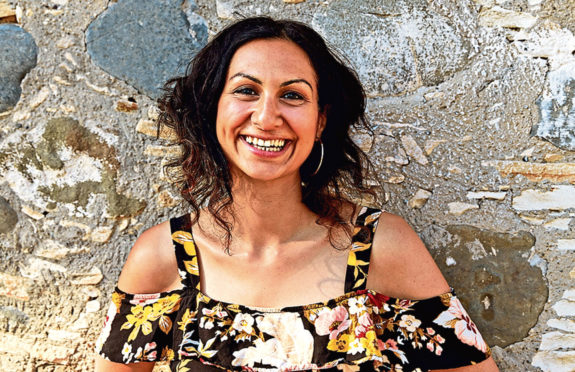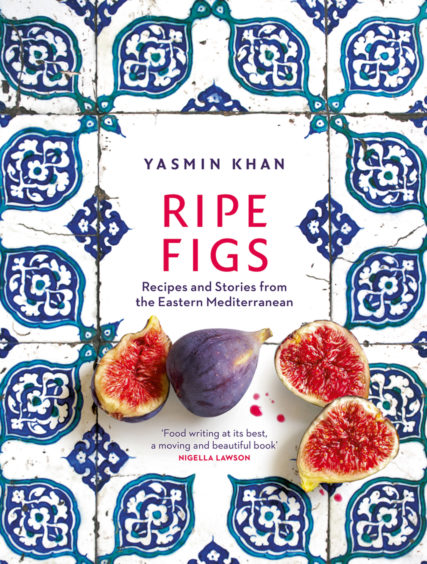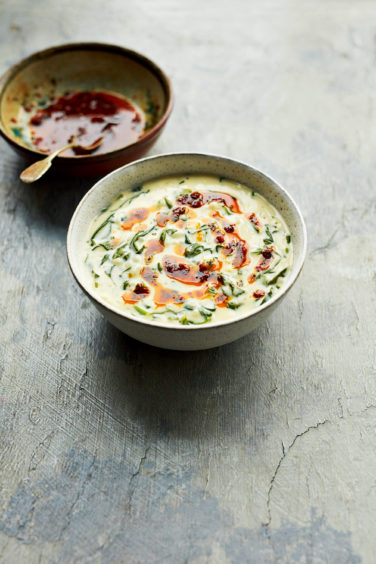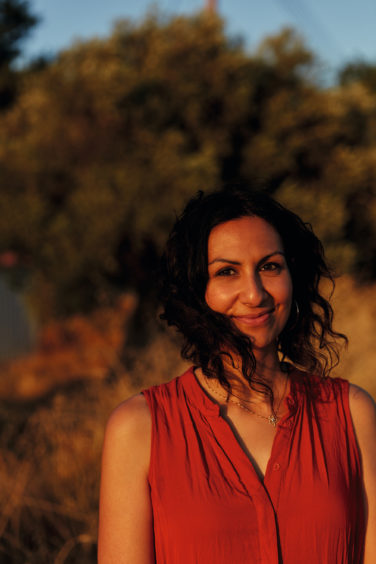
There’s many a plum-coloured, tear-shaped fig in Yasmin Khan’s new cookbook. There is also strength, pain, hope, heroism, loss, and lots and lots of olive oil.
“I get through too much olive oil,” says the campaigner and food writer with a laugh. “I definitely get through those big one-litre bottles more than I’d like to admit.”
It’s a crucial component in Eastern Mediterranean cuisines; even treated reverentially as a seasoning, not just a lowly cooking aid. “I love that,” says Yasmin, 40. “I have a bottle of olive oil I bring to the table in the same way I’d have salt and pepper.”
Those liberal sloshes of olive oil – be it in a Cypriot-style chocolate and orange mousse, or dressing barbecued sardines in vine leaves – embody the generosity and hospitality Yasmin chronicles in the book, Ripe Figs, through gleaned recipes and moving reportage.
It took four separate trips to the Eastern Med for Yasmin to pull together the stories she shares from cooks, restaurant owners, volunteers, migrants and refugees across Turkey, Cyprus and Greece.
These include Lena – a teacher by day, restaurateur by night on Greek island Lesbos – who feeds locals and refugees alike and the Moria refugee camp where refugees are served meals on proper plates, on white tablecloths.
These encounters sit between ideas for hot yoghurt soup, sour cherry cheesecake and Afghan spiced pumpkin.
However, having worked as a campaigner on human rights issues for almost 20 years, covering everything from UK deaths in custody to the occupation of Palestine, Yasmin says researching Ripe Figs was arguably harder.

“When you actually are in these camps, and you hear the stories of how much people risk and what they go through, to say something is heart-breaking feels a little bit gauche or patronising,” says Yasmin. “It’s just so unjust.”
Ripe Figs, she hopes, will help counter negative views around migration.
“With the climate crisis we are going to see huge numbers of people moving because they have to,” she adds.“It’s also really important to realise that throughout human history, for the thousands and thousands of years we’ve existed on this planet, we have always moved; people have moved through empires, for trade, for agricultural reasons. This notion of statehood and nation states is pretty modern.”
Camps and human rights abuses seen at borders are, she says, “trying to stifle something that has naturally existed for our species”.
Covid has of course added a layer of complication. But food – sharing it, cooking it, eating it – can, she believes, cut through divisions.
“Amid this really difficult situation that many of the people I was speaking to found themselves in, we could always find ourselves smiling or laughing when we started sharing recipes, or when we were working in the kitchen,” recalls Yasmin.
“Cooking is one of the few ways you can escape the reality of what is going on around you. It can provide huge solace and comfort.”
Cooking has certainly provided a distraction and a way of “travelling” that has cheered many of us during the long months of lockdowns. Yasmin, who is half-Pakistani, half-Iranian, finds it “extraordinary” that through a recipe from a specific country, city or even town you can “transport a little bit of that culture into people’s homes in other places in the world”. That you can pick up her cookbooks, which trace recipes from Iran (The Saffron Tales), Palestine (Zaitoun), and the Eastern Med (Ripe Figs), and recreate them “in Birmingham, or Brooklyn, or Berlin”.
And really, a plate of food is never just a plate of food. “When you learn about a food culture, you’re not just learning about a set of ingredients, you’re learning about a place’s history, its agriculture, its economy, maybe its gender relations, its climate,” says Yasmin. “Food has got such an extraordinary power to tell us a story.”
The people Yasmin spoke and cooked with weren’t just feeding hungry people dinner. Meals were cooked with kindness; the cooks intent on preserving a person’s dignity, whatever their circumstances.
“It was about telling someone, ‘I care about you, and I want you to know that I’m here, that there is support out there for you’,” explains Yasmin. “The food embodied that so much more than just the calories.”
Yasmin had three miscarriages during the course of writing the book. “I was interviewing a lot of people who are going through lots of grief; I was also going through similar processes,” she says, noting how grief – be it personal or collective – can affect our relationship with food and cooking. “Our appetite for life is so linked to our appetite for being able to enjoy food.”
She doesn’t obscure sadness or retreat from difficult moments, but there’s an irrefutable backbone of hope to Ripe Figs. Turning its pages, the red clay soils, grey-green olive trees and zing of the Eastern Med’s citrus fruits – all that “beautiful warming sunny food” – offer brightness, distraction and a certain amount of freedom.
“I know first-hand how much these recipes brought the people I was meeting with joy,” says Yasmin, “and how much they brought me comfort.”
Hot yoghurt and spinach soup
 Serves 4
Serves 4
You’ll need
For the soup:
- 85g short or medium-grain white rice (Yasmin uses Turkish
baldo rice but pudding rice would also work) - 1L hot chicken stock
- 500g full-fat natural yogurt
- 1 large egg yolk
- 1½tbsp cornflour
- 200ml lukewarm water
- 1tsp dried mint
- 200g spinach, roughly chopped
- Salt and white pepper
For the topping:
- 40g salted butter
- 1½tbsp dried mint
- 1½tsp pul biber (Aleppo pepper) or other mild chilli flakes
Method
- Rinse the rice under running cold water for a few minutes so the starch washes out, then place in a large saucepan. Pour in the hot stock, cover and simmer for 12-15 minutes, until the rice is cooked.
- In a bowl, whisk together the yogurt, egg yolk, cornflour and measured lukewarm water until smooth.
- When the rice is cooked, take a ladleful of its cooking broth and add it to the cold yogurt mixture, whisking as you do so to warm it up. Then take the saucepan with the rice in it off the heat and very slowly, half a ladle at a time, spoon in the yogurt mixture, whisking all the time so it doesn’t split.
- Return the soup to a medium-low heat and add the mint and half a teaspoon each of salt and white pepper. Simmer for five minutes until the soup has thickened.
- Add the spinach and cook for a further five minutes, then taste to adjust the seasoning to your preference. In a separate small saucepan, melt the butter for the topping with the dried mint and pul biber.
- When you are ready to serve, ladle the soup into warmed bowls, drizzle a couple of teaspoons of the hot chilli-mint butter over each portion and serve immediately.
Ripe Figs by Yasmin Khan, photography by Matt Russell, published by Bloomsbury, £26, out now

Enjoy the convenience of having The Sunday Post delivered as a digital ePaper straight to your smartphone, tablet or computer.
Subscribe for only £5.49 a month and enjoy all the benefits of the printed paper as a digital replica.
Subscribe © Matt Russell/PA
© Matt Russell/PA